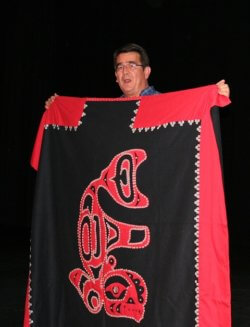During our first field visit to prospective Canadian sanctuary sites, in July 2017, Whale Sanctuary Project president Dr. Lori Marino was invited to speak at Vancouver’s Roundhouse Community Center.

Chief Bob Chamberlin shows a traditional Kwikwasut’inuxw Haxwa’mis blanket depicting an orca totem.
The theme of the evening was “Reconciliation,” and it was introduced by Chief Bob Chamberlin of the Kwikwasut’inuxw Haxwa’mis First Nation. Chief Chamberlin talked about his work in helping to bring about reconciliation between his people and European immigrants. In the same way, he said, it’s time to bring about reconciliation with our fellow animals and the natural world.
Dr. Marino took up the theme of “Reconciliation,” discussing how a sanctuary can give back to whales something of the life they’ve lost by being taken from their homes and families in the wild.
While the Kwikwasut’inuxw Haxwa’mis are a small nation, Chief Chamberlin is increasingly hailed by the wider community of West Coast nations. Most recently, as vice-president of the Union of B.C. Indian Chiefs, he has given voice to one of the most pressing causes of his people: their ongoing battle with the energy company Kinder Morgan. Kinder Morgan plans to build a 715-mile Trans Mountain pipeline expansion, which would allow them to send 890,000 barrels of diluted bitumen oil from Alberta’s tar sands, along inland waterways, through the suburbs of British Columbia, and out to the B.C. coasts.
As explained by the environmental news site Earther:
The pipeline expansion could create an environmental and economic disaster if [the diluted bitumen] spilled in any of the rivers or streams on the pipeline route. Because it’s heavier than conventional oil, it sinks rather than floats on the water’s surface.… Once it reaches the terminal in Burnaby, the bitumen would be loaded on tankers and sent through the maze of islands and channels from the Fraser River to the Haro Strait that divides Canada and the U.S. before hitting the global market.
The pipeline and terminal expansion would allow tanker traffic to increase from five tankers per month to 35 per month, dramatically increasing the odds of an accident and clogging the already-busy waterways of Canada’s busiest port. (March 12th, 2018)
“It’s at a point of exasperation of engaging in due diligence with government,” Chief Chamberlin told the CBC.
“We are constantly pointing to the government’s lack of embracing its very own laws.”
Another critically important cause for all the nations of the B.C. coast is fish farming. Chief Chamberlin is part of the leadership of an alliance of tribes that is strongly opposed to industrial fish farms that poison the waters and are devastating the marine life of the region, in particular the salmon, the herring and the whales, who now find themselves under increasing stress after having lived in harmony with the First Nations people for thousands of years.
The Coastal First Nations of British Columbia – an alliance of tribes – are also calling on senators to vote in favor of Bill S-203, which would permit no more whales or dolphins to be put on display in marine entertainment parks.
Next: The Lummi Nation: Committed to bring the orca Tokitae back home.
